

Ellie Dodge, PhD Angelina Maia, PhD, RD University of New England, Program R.I.T, Nutrition Lecturer, Wegmans Director, MS Applied Nutrition School of Health and Nutrition
Participants will engage in a conversation about approaches to engaging students with social media and digital technologies. Basic tenets of backwards design principles in relation to designing engagement opportunities in academic settings will be discussed. Student work based on these approaches will be showcased. Attendees will participate in a brief and interactive activity to encourage development of assignments that contain a social media or digital technology component.
Participants will be able to describe some of the factors that encourage student engagement and the intersect with academic work Participants will be able to describe Backwards Course Design and how the tenets of this design strategy can be applied to developing assignments with social media and digital technology components Participants will apply the basic tenets of Adult Learning Theory and Backwards Course Design to Graduate-level assignment design
About UNE and UNE’s MS Applied Nutrition Student Theoretical frameworks used to inform course design Connecting theory with practice: using backwards design principles for engaging assignments Examples of student work and engagement with digital spaces Create/refine an assignment that can be enhanced by use of digital technologies
MS Applied Nutrition 36 Credits Completely online 8 week terms Three optional focus areas 3 Campuses and Online College of Graduate and Professional Obesity and Health Promotion Studies Nutrition and Disease Prevention MSEd, EdD Business, Social Media and MPH Entrepreneurship MS Health Informatics 22 classes MS Applied Nutrition MSW SPHP
Age of Students Gender of Students 6% 2% 11% Male 33% 18% 63% Female 67% 20-29 30-39 40-49 50-59 60-69 Male Female
Focus Area Choice 13% Nutrition and Disease Prevention 9% Obesity and Health Promotion 56% 22% Business, Social Media and Entrepeneurship Generalist
Andragogy Constructivism Adults are independent and self- learning is an active, contextualized directed learners process of constructing knowledge Adults need to learn experientially Connectivism Adults approach learning as problem- solving explains how Internet technologies have created new opportunities for people to learn and share information Adult learning is most effective when instruction is task-oriented and problem solving is emphasized. Cooper, P. A. (1993). Paradigm Shifts in Designed Instruction: From Behaviorism to Cognitivism to Constructivism. Educational technology, 33(5), 12-19. Payne, C. (2008). What do they learn? Online and Distance Learning: Concepts, Methodologies, Tools and Applications, 153-161. Siemens, G. (2005). Connectivism: A learning theory for the digital age. International Journal of Instructional Technology and Distance Learning , 2 (1).
Project-Based Learning student competencies go beyond effective and enjoyable way to learn content knowledge and develop deeper learning prepare and challenge the student to competencies required for success in direct their own learning and solve college, career, and civic life problems of academic significance ideas must be explored, developed, integrated, and resolved within the context of a particular assignment for knowledge construction at advanced levels Shsu.edu. (2017). Project Based Learning in Higher Education - Center for Project Based Learning (PBL) - Sam Houston State University . [online] Available at: http://www.shsu.edu/centers/project-based-learning/higher-education.html [Accessed 07 Jul. 2017].
Construction of knowledge: organizing, interpreting, evaluating, and synthesizing prior knowledge to solve problems Students use higher order or critical thinking Authentic intellectual accomplishments: construction of knowledge be guided by disciplined inquiry Students: (1) use a prior knowledge base (2) strive for in-depth understanding of concepts and (3) develop and express that understanding through elaborated forms of communication Intellectual accomplishments have utilitarian, aesthetic, or personal value. Students learning artifacts have value beyond school Bie.org. (2017). Authentic Intellectual Work and Project Based Learning: Why Gold Standard PBL Is So Critical | Blog | Project Based Learning | BIE . [online] Available at: https://www.bie.org/blog/authentic_intellectual_work_and_project_based_learning_why_gold_standard_pb [Accessed 07 Jul. 2017].
Collaborative teams build the courses Faculty serve as ‘subject matter experts’ (SME’s) Instructional Designer facilitates course design process Program Director, Faculty and Instructional Design meet regularly to discuss design process, assignments and artifacts, rubrics and assessment
Employ Backwards Design for course and assignment development course framing questions and course outcomes identify key assessment(s) develop scaffolding assignments Each course has at least one “academic” artifact and one “applied” artifact
Student Learning Outcomes: Assess arguments posed by relevant scholarly literature Convey discipline-specific information to a diverse audience Posit evidence-based solutions to nutrition-related issues and controversies APN 601 Student blogs, based on position papers: https://uneappliednutrition.wordpress.com/
Analyze diet-health experience Assess the hallmarks of effective communication Identify barriers to communication and ways to overcome communication barriers Assess your level of cultural competence Identify areas for improving cultural competency
HTTP://DUNE.UNE.EDU/AN_STUDEDRES/
Preliminary Data Student engagement is high Approaches to content delivery are largely successful at achieving desired outcomes Students of diverse academic backgrounds are enjoying the courses “I was going to wait until after the class was over but I will tell you now that this is by far, hands down the best class I have had. I have learned a great deal from this class and you. I was very excited about this class and it has lived up to my excitement by challenging and increasing my knowledge at the same time!”
Pair off Discuss an assignment you currently teach or plan to teach Identify 1-2 student learning outcomes Using Backwards Design identify one academic and one applied artifact that will support your learning outcomes Come back to the group and discuss your ideas
edodge1@une.edu 207-221-4785 Thank you for attending!
Recommend
More recommend